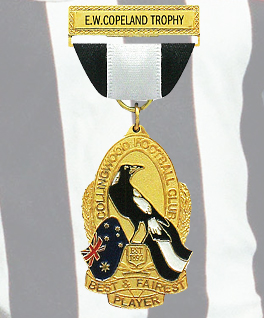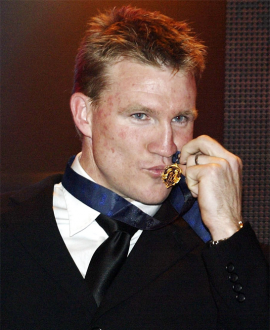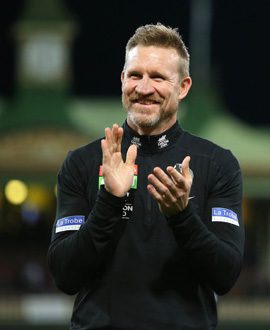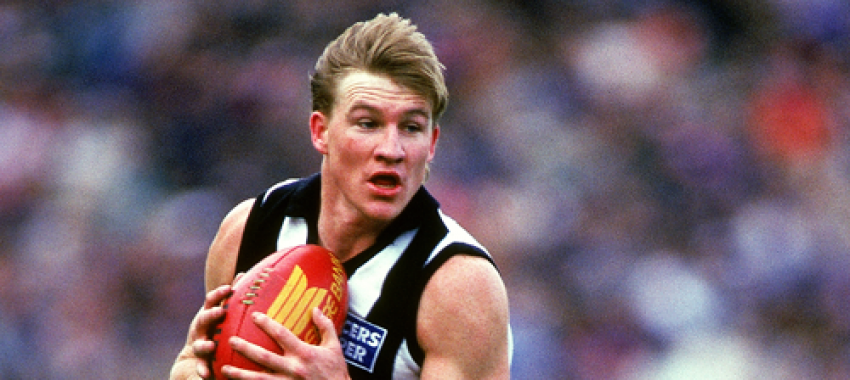
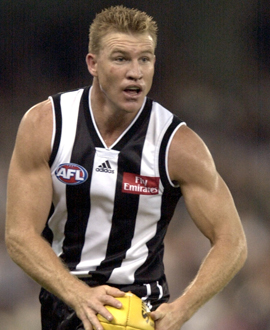
Nathan Buckley is one of the truly monumental figures in Collingwood’s history.
Across 14 seasons and 260 games, he established a benchmark for consistent brilliance that few have been able to match. He is still regarded by many as our greatest ever player. He followed that glittering playing career with a two-year stint as an assistant coach, and ten more as senior coach, going within minutes of winning a flag in 2018.
But Bucks’ greatness extends beyond the Collingwood boundary. He has won just about every individual honour the game can offer, including the Brownlow Medal, Norm Smith Medal, Copeland Trophy (a record six times), seven all-Australian selections and numerous other awards. He also won the Rising Star while with Brisbane, and the Magarey Medal, Jack Oatey Medal and Fos Williams Medal while at Port Adelaide. He has been inducted into the Australian Football Hall of Fame and the Collingwood Football Club Hall of Fame, as well as being a Life Member of both bodies and named in Collingwood’s Team of the Century.
Just about the only thing missing from his CV was an AFL Premiership medal - he won a SANFL one - but that was hardly his fault: nobody could have done more to bring one home. By the end of his career, it's doubtful there were many players in the history of the game who had expended as much blood, sweat and tears chasing that elusive flag.
That sheer determination and unwillingness to compromise didn't always endear Buckley to those around him, but there was an undeniable admiration for his work capacity. He was, by his own admission, a "fairly brash young bloke" in a hurry early on, and wasn't prepared to wait for others who were less driven. In time, he would balance this approach more finely, which was a measure of his own maturity in chasing those goals.
"I've always played football red-lining," he once said. "Everything that I've done in football, I've done because I've worked hard ... whatever I've achieved, whatever I've failed at, it hasn't been for lack of effort."
Collingwood had coveted Buckley since his early years with Port Adelaide in the SANFL, but he had little choice but to play for the Brisbane Bears for a season. In that one year he turned his promise into top level performance, beating a quality field including James Hird, Shane Crawford, Mark Ricciuto, Mark Richardson, Glenn Archer and others, to win the inaugural AFL Rising Star award.
He announced soon that he intended to join Collingwood, saying he desperately wanted to play big finals matches with the game’s biggest club. But his pathway to Victoria Park caused some problems. The Magpies had to compile a list of 10 "untouchables" not for trade, and this created some tension before he even pulled on a jumper. In the end, 1990 premiership player Craig Starcevich and young talent Troy Lehmann headed north.
Buckley was a joint winner of the 1994 Copeland Trophy in his first year at the club. He played in a memorable finals match – a narrow loss to West Coast - and was a genuine star from the outset.
Incredibly, he and the Magpies would not play in another final for eight long years. Through those lean years Buckley's presence was like a beacon of light in a darkened gloom. At times his remarkable consistency, his sublime skills and his drive to succeed towered over the remainder of group. Eddie McGuire said: “The thing that people forget about Bucks is there were five blokes hanging off him every week when the team was at the bottom. He kept the club going when (James) Hird and (Michael) Voss were playing in top sides.”
Two moments that had nothing to do with him also caused a few issues.
The first came when he was named at half-back in Collingwood's Team of the Century in 1997, in only his fourth season, while Gavin Brown was overlooked (he would later be included as the team was added to).
"I thought the club was trying to put me up on a pedestal, to my detriment and its detriment really, early," Buckley said. "The Team of the Century wasn't a great thing. I was put in the side and Gavin Brown was (initially) left out. It just didn't ring true. I can understand the argument, but it doesn't hurt to make a bloke earn his stripes."
In time, though, he would more than justify the selection.
The second moment came when he replaced Brown as captain, in 1999, a season in which he won a fourth best-and-fairest award, adding to those won in 1994, 1996 and 1998, with more to come in 2000 and 2003. "I think that (the captaincy) was before my time," he said. "It was nearly like everything they pushed up in front of me, you had to cope with. You had to find a way."
But on an overseas holiday after the 2000 season - Mick Malthouse's first season as coach - he resolved that his sometimes confronting leadership style had to change for the benefit of the group, as the club looked to even the spread of responsibilities.
"I had a bit of a think about where my footy sat and my leadership and my influence within the group," he said. "There was a bit shift when I came back and I think that was an important part in allowing us to get the most out of the team."
Importantly, that change brought on potential new leaders, and this allowed Buckley to develop into one of the most inspirational and respected skippers in the AFL. As the revamped Collingwood team became a competitive force again, it was able to contest successive Grand Finals against the Brisbane Lions.
Scott Burns, Buckley's deputy in this period, said: “What I really admired from Bucks was his ability to improve as a leader from where he started to where he finished.” Part of that was to do with a greater empathy to his teammates, but Burns also admired how his captain transformed into one of the club's leading hard-ball accumulators and tacklers.
Buckley's performance in the 2002 Grand Final was extraordinary. The Magpies fell nine points short, with the skipper adjudged the best player afield. He accepted the medal, but removed it from around his neck after he left the dais, as it wasn't the medal that he and his teammates had been chasing.
Collingwood went into the 2003 Grand Final as favourites, but the team was outmuscled by the Lions in a one-sided encounter. One of the most poignant images came after that game when Buckley was captured staring longingly at the premiership cup - decorated in Brisbane Lions colours – seemingly wondering if he would ever get another chance.
That same year he won what had long looked his destiny - the Brownlow Medal - in a three-way tie with Adam Goodes, and Mark Ricciuto, who would finish their careers as multiple premiership players. That Buckley didn't achieve the ultimate success as a player has sometimes seen him unfairly judged against other champions.
For Burns, that is nonsense: "Because he didn't have the team success, I think, has been used his against him by others in terms of where he stands in the scheme of things. But to me, he is a no-brainer as the No.1."
"If I had to pick any player in the competition, it would be Bucks, because I have seen him beat the likes of Matthew Richardson and Wayne Carey; I've seen him kick six goals as a centre half-forward; I've seen him win All Australian selection as a half-back; I saw him as a brilliant wingman when he was at Brisbane; and then saw him develop into a great inside midfielder at Collingwood."
"He had every attribute you could have - speed, strength, skill. He had it all. If he had been at any of those other clubs who might have been a bit better than we were, he would still have won all their awards."
Burnsy knows what he's talking about, of course. Bucks was arguably the finest kick in the game at the time, and one of the best we've ever seen - incredible depth, power, distance and precision. But he was also fast, strong and could bust through packs, or take contested marks and win his own footy in close. If he got the ball outside then you were done. He could play everywhere - half-back, wing, centre, or key forward or key back. He was the complete footballer, and would have been a champion in any era.
Sadly, one of Buckley's great strengths - his durability - was tested in his last few seasons, mainly due to a running battle with his hamstring. He managed only five games in the latter stages of the 2007 season, injuring his hamstring once more in the preliminary final loss to Geelong. It was his 260th –and last - game for Collingwood.
He explained his retirement: "In the end, I maxed out, I was always running myself into the deck," he recalled. "I wasn't one who could cruise around and do things at 80 per cent."
As with Bobby Rose, the champion of the 1950s to whom he was so often compared, there was a sense of inevitability about Buckley one day returning to coach Collingwood. When that happened it came via the infamously contentious planned coaching handover with Mick Malthouse, which meant Bucks inherited a post that was something of a poisoned chalice. Two finals series came in his first two seasons at the helm (2012-13) before four difficult seasons that passed without finals. His coaching future seemed bleak.
But Collingwood stuck fat, and was rewarded with a stunning season that saw the Pies rise from 13th all the way to a Grand Final. Just before quarter-time of that game, it was five goals to zip and looking great. The Eagles duly fougt back and the game turned into an arm-wrestle. We still led with less than two minutes to play, but a freakish end-to-end play and clutch Dom Sheed goal sunk our hopes.
In 2019 Bucks' Pies proved that the 2018 resurgence had not been a fluke, making it to a preliminary final where they lost to the Giants. Two more finals came in the Covid-interrupted 2020 season, but 2021 was a disaster, the team languishing near the bottom after salary cap issues had caused a messy fire sale at the end of the 2020. Bucks saw the writing on the wall and retired mid-season.
In the end, fortune didn't fall his way in the key moments as a coach. But that does nothing to diminish his standing as a player, and he remains among the top few players this club has ever produced. At the end of his life, Jock McHale labelled Bob Rose the greatest Collingwood player he had seen. Two generations later, near the end of his own life, Rose told those closest to him he considered Nathan Buckley the best Magpie footballer he had the pleasure of watching. Today, Scott Pendlebury is also in those discussions.
Such rankings are the stuff of bar-room and online discussions. But these things are clear: Nathan Buckley gave absolutely everything he had to the Collingwood Football Club, first as a player and then as a coach. He is, and always will be, one of the club's greatest ever players, and one of its favourite sons.
- Glenn McFarlane
CFC Career Stats
| Season played | Games | Goals | Finals | Win % |
|---|---|---|---|---|
| 1994-2007 | 260 | 263 | 10 | 43.5% |
CFC Season by Season Stats
| Season | GP | GL | B | K | H | T | D | Guernsey No. | ||
|---|---|---|---|---|---|---|---|---|---|---|
Other CFC Games
| Team | League | Years Played | Games | Goals |
|---|---|---|---|---|
| Collingwood | Night/Pre-season | 1994 - 2004 | 23 | 23 |
Also Played For
| Team | League | Years Played | Games | Goals |
|---|---|---|---|---|
| Brisbane Bears | AFL | 1993 | 20 | 21 |
Awards


 x7
x7
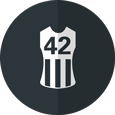


 x9
x9



 x6
x6





